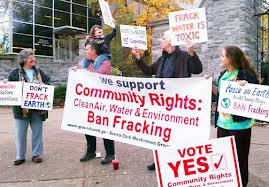Commentary by S. Tom Bond of Lewis County, WV
Many areas now have moratoria or bans on shale drilling and / or hydraulic fracturing as presently conducted. The latest is Longmont, Colorado. Its city charter now bans the practice. Some 60% of the votes on Ballot Question 300 were against drilling and storage of drilling waste in the city. The population of Longmont was 86,270 as of the most recent census, the 13th largest city in Colorado.
The oil and gas industry fought the ban hard, giving half a million dollars to an opposing group. Last year a drilling company began to drill near Union Reservoir where people can enjoy fishing, swimming, no-wake boating, camping, windsurfing and picnicking. There has been a great deal of shale drilling in Colorado, and despite low population density, its effects are well known.
Those interested in more information are referred here.
And, for background information and current news see here.
Readers of FrackCheckWV.net are knowledgeable about many of political areas which have rejected drilling, at least for a time. Here is a partial list: New York State; Maryland; Vermont; Delaware River Basin; Catskill water supply region for New York City; Quebec (Canada); New South Wales (Australia);
France; Bulgaria; South Africa
Some other places where there is a strong anti-fracking movement: Illinois; California; Ohio (including Columbus); Nova Scotia (Canada) and New Brunswick (Canada).
FrackCheckWV.net does not oppose natural gas drilling per se. But, it is clear that many serious issue exist that are not receiving appropriate attention by the industry, by state governments, nor by the federal government. There are health problems due to air and water pollution, destruction of aquifers, threat to drinking water supply, destruction of wildlife and domestic animals, depreciation of property values, and such other values as hunting and fishing, recreation and quiet enjoyment of life.
The general environment should be protected. Public lands should be off limits for degradation. The public is catching on.
Everywhere shale drilling goes opposition occurs spontaneously, due to the same constellation of problems. Some of the groups formed are highly specialized. Chefs, wineries, some religious groups, organic farmers, fishermen, outdoor recreation enthusiasts, physicians, among others. Some are older environmental groups moving in a new direction. Where ever the population is most dense and best educated, the reaction is strongest.
Lawyers are very interested in these problems, too. Some are interested in helping get appropriate laws passed, like the Community Environmental Legal Defense Fund (CELDF). Some are interested in helping landowners, like Clark Law Firm. Some go for the big bucks. Shale drilling is a veritable feast for lawyers, on both sides.
The shale beds are believed to be the original source of gas and oil above them in the geological strata. Although the resource is large, it is not unlimited. Any kind of conservation for the future is un-thought-of. Resource recovery is only 10%, one of, perhaps the lowest of any petroleum recovery. There is no coordination of companies. It is “every man (corporation?) for himself, devil take the hindmost.”
Then there’s Global Warming. There is no sign of any substantial effort to get away from burning carbon as the principal source of energy by any industry or nation (except, perhaps Germany, the leader in solar). Gas burns cleaner, as the industry constantly reminds us, but the effect of escaped gas and the pollution at the source they ignore. All forms of carbon burning pollute at both ends, extraction and consumption.
We need rational policy and real regulation of extraction industries. We need a political agenda that works for the public, not the energy magnates. We need a world where our children and our children’s children can survive and enjoy a good life. If the industry can’t perform, regulation must come from somewhere. Whether you like it or not, government seems to be the only alternative.


{ 2 comments… read them below or add one }
I think that most people would agree that natural gas has potential to be a great energy source, its just these generic drilling programs where cutting cost and production are king that are the problem. This needs to be done on a smaller scale and then studied for all aspects. There needs to be an effort to find alternatives to hydraulic fracturing methods like propane fracks. Using the amount of freshwater for all of these monster payzones is crazy and destructive. They could even use coal mine runoff instead of fresh water. There needs to be an effort to plug all of the abandoned wells especially if there are new horizontal wells in a radius of these abandoned wells. With all of this in mind I think we need to prioritize at best.
Hopefully, corporations will begin to understand that the general public wants more information than the hype they put out. The public wants to decide for themselves whether the benefits of any products/services outweigh the detriments. This decision is based on truthful, well researched information on both the short term and long term effects/impacts of the corporation’s product/service.
Until corporations change the business ideology to include this thinking, you’re right, the government needs to intervene. Also more of the public need to educate themselves about these impacts, instead of accepting the corporation’s hype. The final decision is a two way street.